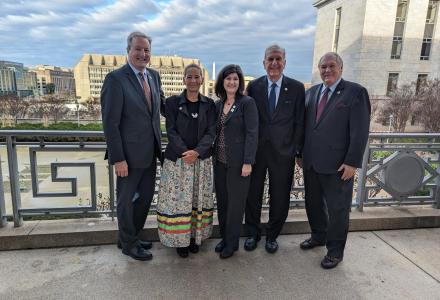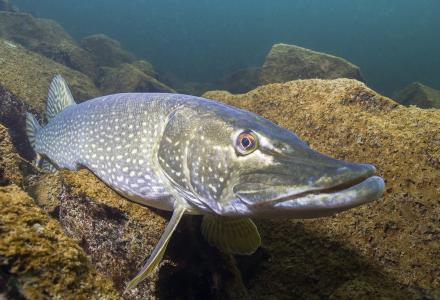
Flooding is impacting all of the Great Lakes and understandably dominating headlines and concerns of shoreline communities. At the IJC’s first public consultations of 2019 to consider progress to restore and protect the lakes, researchers and residents reaffirmed that water quality issues also must continue to be a priority.
Over the week of June 10, the International Association for Great Lakes Research held its annual research conference at The College at Brockport: State University of New York.
At the conference, the IJC held town hall sessions on Wednesday, June 12, where IJC Canadian Commissioner Henry Lickers welcomed participants with a traditional indigenous Thanksgiving address. Over seven subsequent sessions, participants contributed their perspectives on progress to control existing and emerging chemicals of mutual concern, nutrients, aquatic invasive species and discharges from ships, and consider the role of climate change and science in Great Lakes restoration efforts.
After IJC US Chair Jane Corwin provided opening remarks for the final plenary session of the town hall, Lickers joined IJC Great Lakes advisory board members Scott Sowa, John Jackson and Deborah Lee for a panel discussion. The panelists answered questions that stimulated the town hall participants’ feedback on topics such as the lack of consistent funding for water quality projects and consultations with diverse stakeholders, particularly indigenous communities.
Other comments revolved around struggles with short deadlines required to regularly report on the Great Lakes, as areas like invasive species and chemical contaminants often require decades of research to show changes in lakewide trends.
The following week, the IJC hosted two public consultation events in conjunction with the Great Lakes Public Forum in Milwaukee, Wisconsin. The forum was held from June 17-19 by the governments of Canada and the United States to outline efforts to accomplish the goals and objectives of the Great Lakes Water Quality Agreement (GLWQA).
More than 140 residents attended the IJC’s evening meeting on June 18, where four commissioners—Canadian Chair Pierre Béland, Corwin, and US Commissioners Robert Sisson and Lance Yohe—listened to a panel of local experts and the audience discuss the region’s efforts to become global leaders in sustainably managing water resources.
Milwaukee Water Works Superintendent Karen Dettmer outlined the city’s efforts to test for 500 existing and emerging contaminants to ensure safe drinking water, upgrade and expand treatment facilities, and replace as many as 1,000 lead service lines per year.
Karen Sands of the Milwaukee Metropolitan Sewerage District and the IJC’s Great Lakes Water Quality Board outlined regional efforts to educate and engage residents in green infrastructure initiatives, and Brenda Coley of the Milwaukee Water Commons emphasized community outreach and environmental justice to encourage water access and stewardship.
Audience questions and comments primarily honed in on local topics, including permitting for Great Lakes water withdrawals for a new production plant by FoxConn in nearby Mount Pleasant, Wisconsin, regulations on lead pipe replacements for schools, and a need to update Wisconsin’s curriculum to include more Great Lakes material.
Basinwide concerns also were noted, with emphasis on the lack of diverse public engagement and individual action to protect the Great Lakes. Additional concerns were raised with respect to harmful algal blooms, climate change, and emerging contaminants.
 The next afternoon, the IJC held a roundtable session to discuss four key questions with more than 115 participants. Commissioners, IJC staff and members of the IJC’s Great Lakes boards heard from a variety of regional residents about concerns for Great Lakes water quality, whether they feel the governments were fulfilling their responsibilities under the GLWQA, what issues the IJC should investigate to contribute to Great Lakes restoration, and what single action could make the biggest difference toward improved water quality. The governments released a Progress Report of the Parties on June 13, outlining recent activities under the GLWQA.
The next afternoon, the IJC held a roundtable session to discuss four key questions with more than 115 participants. Commissioners, IJC staff and members of the IJC’s Great Lakes boards heard from a variety of regional residents about concerns for Great Lakes water quality, whether they feel the governments were fulfilling their responsibilities under the GLWQA, what issues the IJC should investigate to contribute to Great Lakes restoration, and what single action could make the biggest difference toward improved water quality. The governments released a Progress Report of the Parties on June 13, outlining recent activities under the GLWQA.
Questions on the role of the governments and the IJC were met with relative consensus. Participants said the GLWQA’s framework is sufficient, but the two countries need to be held to deadlines and specific tasks to encourage public accountability. Participants felt the IJC should be more active in engaging with a range of community groups throughout the basin to streamline coordination and share resources, as well as be more critical if the two governments fall short of their promised timelines.

Questions about concerns and what single action is needed to help the lakes elicited more varied reactions, though some themes reoccurred across tables. Participants emphasized a need for outreach, including increased water education and collaboration with community groups to reach marginalized communities throughout the basin.
Reoccurring issues raised included algal blooms and nutrient loadings, climate change, the gap between economic and environmental concerns, aging infrastructure, plastics, connecting upstream interests to the lakes, flooding, environmental justice and chemicals of mutual concern.
The Milwaukee meetings were the start of the IJC’s “Step In and Speak Out for the Great Lakes” consultations, which will continue throughout the region until early October. To find your nearest public meeting, visit the IJC’s website for details and registration.
"See Also: Traverse City, Collingwood and Goderich to host IJC Meetings in July and August"

Sarah Colbourn is a public affairs intern at the IJC’s Washington, D.C., office.



